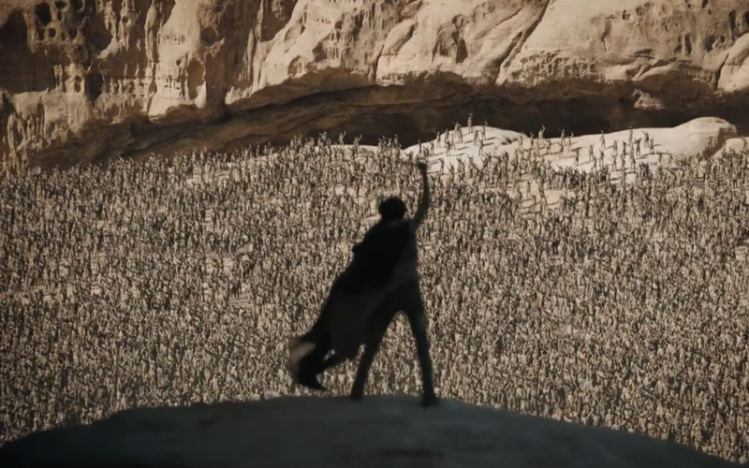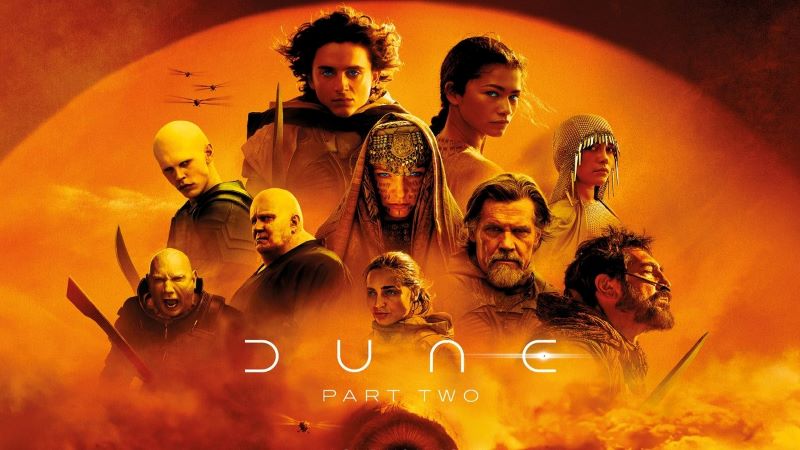Back in 2021, French Canadian director Denis Villeneuve released his highly anticipated adaptation of Frank Hebert’s seminal science fiction novel Dune. There have been previous attempts to bring the novel to the silver screen, like Alejandro Jodoworsky’s insanely ambitious attempt at an adaptation, or David Lynch’s flawed yet fascinating adaptation in 1984. Adapting the first two-thirds of the novel, Villenueve’s adaptation of Dune was a labor of love from the director, complete with an all-star cast of major talents such as Timothee Chalamet, Rebecca Ferguson, Oscar Isaac, and Stellan Skarsgard. Villeneuve’s passion paid off, as it was a massive success, grossing $434 million on a $165 million budget, receiving critical acclaim from both critics and audiences, and was nominated for 10 Academy Awards, including Best Picture, and ended up walking home with 6 of them. Because of this, the second part of Villeneuve’s Dune adaptation, covering the last third of the novel, became highly anticipated. After much delay because of the writers and actors’ strike of 2023, Dune: Part Two is finally here, not only being an amazing film and a fantastic adaptation of the book but also one of the first great films of 2024.
Picking up where the first film left off, the film follows Paul Atriedes (Timothee Chalamet) as he continues his journey on Arrakis, integrating himself into the Fremen natives and learning their ways, alongside developing a relationship with Chani (Zendaya). Meanwhile, his mother Jessica (Rebecca Ferguson) becomes the Reverend Mother of the Fremen and starts to spread the legend of him being their messianic figure, Lisan al Gaib, the “Voice from the Outer World”. Paul seeks revenge against those who conspired against his family, House Harkonnen, and Emperor Shaddam IV (Christopher Walken), who have a new prospect in their midst of heir apparent to the Harkonnen, Feyd-Rautha. As Paul gathers forces and wages war, he must embrace his role as a messianic figure, even if it means bringing about the dark, terrible future that he wants to avoid.
An amazing ensemble cast, with standout performances from Chalamet, Zendaya, and Butler.

Like with the first film, one of the major strengths of the movie is the ensemble cast, and that’s made apparent with the lead performance of Timothee Chalamet as Paul. He was great in the first film, and even better here, having great chemistry with the other actors be it Zendaya or Javier Bardem. But Chalamet shines in the latter half of the movie, where he fully embraces his role as a messiah and all of the darkness that comes with it. The highlight of this performance is in the scene where he addresses all of the gathered Fremen, with Chalamet being commanding, captivating, and awe-inspiring in his presence and speech. Yet this scene also has an uneasy and awful undercurrent of dread to it, as Paul is all but cementing the dark future he saw and feared in his visions. On equal footing with Chalamet is Rebecca Ferguson as Jessica, who also goes down a darker path spreading the belief among the Fremen people of Paul being Lisan al Gaib, showing her roots as a member of the Bene Gessirit order. She gets downright scary in some of the later scenes of the film.
The Harkonnens are still excellently creepy, with Stellan Skarsgard still bringing that grave Colonel Kurtz-esque quality as Baron Vladmir Harkonnen. On the other hand, Dave Bautista gets to show off some more range as Rabban, namely his rage and frustration as the Fremen continue to revolt against the Harkonnen rule. But the MVP of the Harkonnen camp has to go to Austin Butler as Feyd-Rautha. As someone familiar with Butler growing up through his appearances on Nickelodeon and Disney channel shows, it’s strange yet amazing to see his star blow up overnight thanks to his lead role in Baz Luhrman’s Elvis. Here, he more than proves his talent, as he’s excellent as Feyd-Rautha, especially when compared to the likes of Sting in the David Lynch adaptation. Butler plays the part as unhinged and violently psychotic, yet with a twisted sense of honor that tempers him. He makes quite the impression in his introduction, asking his Cenobite-esque concubines what pieces of his gladiatorial opponents bring back before testing the sharpness of his blades by using them to kill a servant. Butler is creepily excellent and is a real standout amongst the cast, transforming himself into being unrecognizable and making me very interested in seeing where he takes his career.
A distinct improvement over the first part is giving larger and prominent parts to the likes of Zendaya’s Chani and Javier Bardem’s Stilgar, who are both excellent in the film. Zendaya here is fantastic, giving Chani a much more cynical edge when compared to her book counterpart, and has great chemistry with Chalamet. What makes Zendaya particularly fantastic is seeing how she can convey a lot in a silent look or a facial expression. Bardem, on the other hand, plays the part of Stilgar as a bit more jovial when compared to his stoic and blunt portrayal in the first film. What Bardem does fantastically is the transition from Stilgar as a stoic yet jovial mentor figure to Paul to someone completely enveloped by fanatical religious fervor in his belief of Paul being the Lisan al Gaib. The film also gets a lot of humor out of Stilgar’s belief in Paul being Lisan al Gaib. It’s best shown when Paul tells the sietch that he is not there to be their leader but to learn from them. Stilgar proceeds to take some of his fellow tribesmen aside and says that’s only further proof of him being the Lisan al Gaib, as he would be far too humble to outright proclaim himself as such.
Sadly, I feel like two underutilized cast members are Florence Pugh and Christopher Walken as Princess Irulan and Emperor Shaddam IV. However, this does make sense considering both of their minimal roles in the book, and both actors are well cast in the roles. Pugh is good in the role of Irulan, displaying wisdom beyond her years in her scenes. Walken, on the other hand, is a rather interesting pick for Emperor Shaddam IV. When I read the book, I pictured the likes of Charles Dance as the Emperor, because his regal presence and deep, baritone voice fit the character. Walken, on the other hand, brings a listlessness to the part, and does have presence to the role despite his limited screentime as well. I look forward to seeing Pugh in future installments, as she has the same potential as Zendaya to give a fantastic performance as Irulan.
A film that captures the scale and moral complexity of the source material.

Like with the first film, what Villeneuve captures so perfectly from the novel is the immense sense of awe and scale in its spectacle. The two scenes that highlight this are Paul riding a sandworm for the first time, and Paul and the Fremen’s assault on the capital of Arrakeen. Even the small-scale moments of the film still contain that same level of excitement, be it Feyd Rautha’s fight in Geidi Prime’s gladiatorial arena or the duel between Paul and Feyd at the end. While many blockbusters contain big, crowd-pleasing set pieces that are entertaining and exciting, what Dune Part 2 does so differently is inspire a sense of breathtaking awe in the viewer, similar to what Peter Jackson’s Lord of the Rings trilogy did 20 years earlier.
What Villeneueve also excels at in his adaptation is capturing the dark, moral complexity of the books. The Dune books (primarily the first six novels by Frank Hebert) are known for deconstructing hero-related tropes like the chosen one or the messianic archetype. While I do like David Lynch’s 1984 adaptation, one of its major flaws was that it rushes through the last third of the book, simplifying the conflict between the Atriedes and the Harkonnens into a case of good guys vs bad guys. Villeneuve, on the other hand, fully explores the darkness and moral complexity of the novels by adapting some elements of Dune: Messiah into this film. It fully shows the darkness of what Paul embracing the role of Lisan al Gaib will bring, and what it will cost him along the way. Best of all, it opens up an avenue to adapt the other Dune novels in the future.
Dune Part Two is currently the must-see movie of the year, an achievement from Villeneuve and an overall fantastic adaptation of the book. The ensemble cast is fantastic, with real standout performances from Timothee Chalamet, Zendaya, and a phenomenally scene-stealing Austin Butler. Its set pieces capture the awe-inspiring scale of the book, as well as bringing in its darker moral complexities. With the success of the film, I hope that Denis Villeneuve can at the very least conclude Paul’s story with an adaptation of Dune: Messiah. Highly recommend seeing this in theaters on the biggest screen possible.
You can check out my review of the first part here

Fantastic review! I’m definitely looking forward to watching this one soon. I was such a massive fan of the first film which I regard one of the best sci-fi movies ever made. I adored the depictions of the Middle East in the film. Here’s why I loved it: https://huilahimovie.reviews/2021/10/28/dune-2021-movie-review/
LikeLiked by 1 person
The fact that we live in a world where a Dune film adaptation leaves little for book fans to complain about is surreal. That’s really all I have to say.
LikeLiked by 2 people
The funny is that my cousin-in-law (who is a massive Dune fan) said that he wasn’t a fan of the changes made for the movie.
LikeLike
An excellent review once again. I had a chance to finally see this movie and absolutely adored it. A spectacular sequel that found ways to surpass the high standard set by its predecessor. I loved the authentic depiction of the Middle East. Here’s why I loved it:
LikeLike